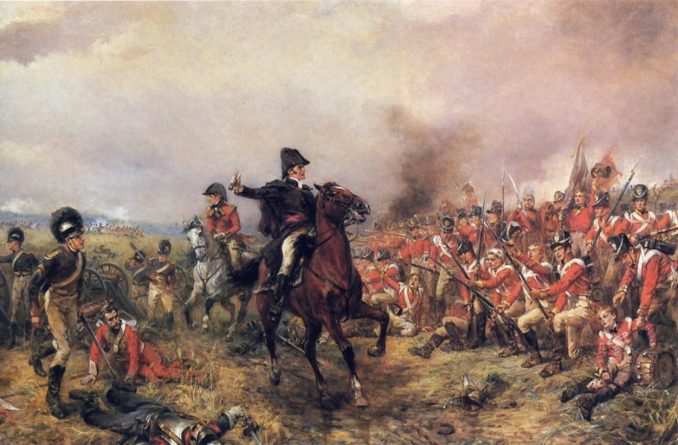
Robert Alexander Hillingford / Public domain
You asked for it, dear Puffins! So here it is: another piece on one of my favourite subjects, the 1st D of W – this time about how he dealt with civil and other serpents. If you thought that civil serpents are a modern-day phenomenon, think again! They were around when Wellington was fighting our wars in India and in the Peninsula, and they were most certainly around when he was PM. The number of civil serpents was much smaller than today, but they and that other lot of serpents, from amongst those English politicians who despised the Tories and adored Napoleon, were as poisonous as today.
All of them wrote letters, constantly: to each other, their families and the newspapers. Just as today, Westminster was a hive of gossiping rumour-mongers, but thanks to them, we know about how Wellington dealt with them – always in the same way, be it as general, as field marshal or as PM. Explicit descriptions regarding his dealings with civil serpents come from his time as PM.
His attitude cannot be separated from his character and his experiences in the wars. This shines through even in contemporary anecdotes written by those who had no great liking for him. It’s these character traits which were bound to make him the foe of civil and other serpents, especially when combined with his famed reputation for icy-cold ferociousness towards inept ‘underlings’. Simply devastating!
His experience as general and field marshal most certainly coloured his attitude to those ‘under his command’, his “ministerial officials”. Not even his cabinet ministers were exempt. I love this quote, showing clearly how he expected things to go:
“Today I had my first Cabinet meeting as Prime Minister, an extraordinary affair. I gave them their orders and they wanted to stay and discuss them.”
He wrote this in a letter to a relative – surely a bit tongue-in-cheek? This allows me to swerve briefly and elegantly to a side issue of some importance: Wellington was an inveterate writer of letters, dispatches (of course!) and memoranda. He wrote them to his ministers, he wrote them to relatives, he wrote them to friends – many fine ladies amongst them, and since you ask: yes he had affairs galore, but we’ll keep that for another day!
Back to those letters, dispatches and memoranda – there are 500,000 items in the collection kept at Southampton University. Rory Muir writes in the 1st volume of his outstanding Wellington Biography that:
“He wrote a vast amount, more than 2 million words in five years in the Peninsula, while busy with much else – but his style was remarkably direct, vigorous and devoid of pomp, while retaining enough formality to mark his letters as official documents.” (Muir, “Wellington: The Path to Victory 1769 – 1814”)
If you think this must surely make him the perfect bureaucrat – endlessly producing paper – think again! He was actually also busy with that small matter of fighting a war, of going into battles. Those letters etc were the battles he fought with Whitehall officials and the government at the same time.
Wellington’s character and attitude towards ‘doing business’ becomes visible during the Peninsular War, not least thanks to the equally prolific writings by his staff and his other officers – not all of whom were enamoured of him, quite the opposite in fact! These letters, you understand, are generally supposed to be read with a mental ‘gasp, omigawd!’ as the horrors of facing him are described. Inadvertently though clues are dropped about the character of the man, a character which made him such formidable foe, so hard to deal with for serpents, be they the Frogs or the civil and other English serpents.
One point they made was about his temper. He learned to keep it well in check, that’s why later in life he was the perfect example of the cool, aloof aristocrat when in public, even though those who knew him in private life knew different:
“Far from being aloof, imperturbable or Olympian he was quick to laugh and volatile in his spirits which were seldom, if ever, hard to read.” (Muir, “Wellington: The Path to Victory 1769 – 1814”)
Those who misread him though were in for a miserable experience. There’s an anecdote about a Spanish general who was seen outside his room: clinging to a bannister, pale, shaking and crying because he had just been subjected to one of Wellington’s feared displays of ice-cold fury.
Then there’s his impatience with those who were not ‘on top of their brief’ but, clinging to sheaves of notes, were given to waffling. Those who had to report to him on a daily basis felt intimidated, like F. Seymour Larpent, a judge-advocate attached to Wellington’s army, who said he often felt like a school boy meeting the head master. Larpent provides us with another clue as to why civil and other serpents found Wellington “impossible”:
“Lord Wellington reads and looks into everything.’ […] He had a quick eye and spotted even a ‘wrong casting up of numbers’ in a single column of a large return. He had a relish for detail, even if he liked to grumble about his workload.” (Muir, “Wellington: The Path to Victory 1769 – 1814”)
Oh dear! No waffling permitted, everything checked with an ‘eye for detail’ – yep, that’s bound to make life difficult for those who had to face him and his ‘steely-blue eyes’ …
It’s astonishing though to read in a gossipy letter by another of those prolific political letter writer, Thomas Creevy, a Whig and no friend of Wellington’s Tory government, that as PM, this intimidating man kept his temper in check and didn’t reduce grown men to quivering wrecks, crying in the corridors of power – to the contrary:
“Thomas Creevey told his niece, ‘The Beau [that was also Wellington’s nickname] is rising most rapidly in the market as a practical man of business. All the deputations come away charmed with him. But woe to them that are too late! He is punctual to the second himself, and waits for no man.’” (Hibbert, “Wellington: A Personal History”)
Intimidating – formidable – to the point – punctual – with an eye for detail – scary! But even so, he was actually willing to listen and debate, according to Lord Lyndhurst, the Lord Chancellor, who wrote that:
“he was ‘a good man to do business with, quick and intelligent’ and, unlike Peel, who would ‘take up his newspaper and sulk’ if his opinion were not adopted, the Duke ‘was always candid, reasonable and ready to discuss fairly every subject’.” (Hibbert,”Wellington: A Personal History”)
We know about Peel, don’t we! He set up policing in London when he was Home Secretary during Wellington’s first Premiership. What isn’t taught in our educational establishments is that Peel had Wellington’s full support for his reform.
Getting back to his way of working when PM, there’s praise even by a Frenchman – yes, really:
“If I have anything to communicate to his Grace [recorded the French Ambassador, Count Sebastiani] I write to ask at what hour he will receive me. The hour is instantly appointed; I find him punctual as the clock, and in half an hour he has heard my report … and gives me an answer without any ambiguity. Thirty minutes with him suffice to transact what can never be accomplished in as many hours with our wavering ministers of France.” (Hibbert: “Wellington: A Personal History”)
One shudders to think what the 1st D of W would have made of our esteemed mandarins who can get nothing done without first forming several committees – I bet we’d see mandarins resigning in tears, en masse!
His government fell in 1830, that of the Whigs four years later. He refused to become PM again, but stood in for Peel, for three weeks in November and December 1834 as Peel made his way back from Rome. Wellington acted as interim PM, taking on the responsibilities of PM and of most of the other ministries. Some civil serpents must’ve been shaking in their boots, others however were impressed:
“He moved about Whitehall from one government office to the next with ‘unperturbable self-confidence’, giving orders and making decisions in what Disraeli described as his familiar ‘curt, husky manner’, deeply impressing a Foreign Office official, Charles Scott, son of Sir Walter Scott, with his ability to come straight to the point, to do business promptly and to write ‘short, full and clear’ directions” (Hibbert, “Wellington: A Personal History”)
Giving ‘short, clear directions’ – that is precisely how his officers described him during battles, be it at Salamanca, be it at Waterloo. What was good enough for his army was clearly good enough for civil serpents!
And now …. You’ve waited long enough! Here’s my favourite anecdote, finally, with my emphasis added because this is Wellington at his finest:
“[He was not] in the least in awe of experienced and well entrenched civil servants, treating them as though they were recalcitrant staff officers. An official at the Treasury was said to have informed the Duke that a certain change in the department’s methods of accounting was impossible to achieve. ‘Never mind,’ the Duke replied. ‘If you cannot accomplish it, I will send you half a dozen pay-sergeants who will.’” (Hibbert, “Wellington: A Personal History”)
Yay! That’s the way to do it! The Great Man knew full well how to treat those ‘well entrenched’ civil serpents! Ours today would be sharing the experience of that Spanish General if they had to face him!
I’ll leave you with this assessment, again by Rory Muir, which helps to explain why historians in general, not just the inveterate Lefties, have preferred to listen to the grumblers, croakers and offended:
“He was impatient, irritable and sharp-tongued, and lacked the charm or warmth of manner to make up for this and so win the affection of those around him. […] In Cabinet, in Parliament and in the country, he did not attract the intense emotional loyalty that is a key facet of at least one type of leadership. He did not fit the mould of a great hero in the age of Romanticism, and many of his officers and even his personal staff found no difficulty coming out in opposition to him later in life. This gave him some pain, but for Britain as a whole, it was no bad thing. One Napoleon was enough for any generation.” (Muir, “Wellington: The Path to Victory 1769 – 1814”)
A British Napoleon? The mind boggles! No, Wellington, who despised Napoleon and hated hero-worship, much preferred reticence and aloofness. However, let me give the last word to the Great Man, who said when he was PM:
‘The people of England must be governed by persons who are not afraid.’
Amen to that! Sadly, today we don’t have the likes of this formidable man to do battle with our entrenched civil serpents.
© colliemum 2020



